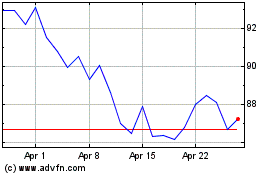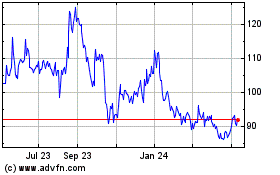By Jared S. Hopkins
The Covid-19 vaccine from Pfizer Inc. and BioNTech SE remains
highly effective six months after its second dose, an indication
that protection could last for an even longer period.
The findings, released on Thursday, emerged from a continuing
review of how volunteers in the shot's late-stage trial were faring
and whether they contracted Covid-19 with symptoms.
In the rush to introduce vaccines for a new virus, companies and
other vaccine researchers were unable to determine how long shots
would provide protection, or whether booster shots would be needed
to ensure protection.
It still isn't clear how long protection will last beyond six
months. The companies said they planned to continue to monitor
study subjects for two years. Some vaccines, such as the one for
measles, provide lifelong immunity while others, such as for the
flu, need to be given every year.
The further analysis suggested the vaccine worked effectively
against a variant first identified in South Africa, Pfizer and
BioNTech said. And the companies said they haven't found serious
safety concerns so far.
"It is an important step to further confirm the strong efficacy
and good safety data we have seen so far, especially in a
longer-term follow-up," said BioNTech Chief Executive Ugur
Sahin.
Pfizer Chief Executive Albert Bourla said the additional results
provide "further confidence in our vaccine's overall
effectiveness."
The companies said they now expect to file for full approval of
the vaccine in the U.S. as early as this month. It's been cleared
for use so far on an emergency basis.
The vaccine was the first authorized in the West last year,
after the late-stage, or Phase 3, trial found it was 95% effective
at preventing Covid-19 with symptoms and was generally safe.
In the U.S., the vaccine is cleared for use in people age 16 and
older.
The shot has now become a key cog in global vaccination efforts.
The companies have distributed more than 200 million doses globally
and plan to produce 2.5 billion doses this year.
On Wednesday, the companies said the vaccine was 100% effective
in children ages 12 to 15, results that could lead to the vaccine's
U.S. authorization for use in adolescents in May.
The vaccine uses a new gene-based technology, named messenger
RNA after the molecules that carry genetic instructions to cells to
make proteins. Production of the proteins trains the immune system
to recognize the coronavirus and fight it.
The new analysis looked at the vaccine's performance in 46,307
people who enrolled in the Phase 3 trial, starting in July.
Of the 927 cases of symptomatic Covid-19 observed through March
13, 850 were in people who received a placebo and 77 in people who
were vaccinated, according to the companies.
That corresponds to a vaccine efficacy of 91.3% up to six months
after getting the second dose, Pfizer and BioNTech said.
The protection remained generally consistent across age, gender,
race and ethnicity, as well as among individuals with underlying
health conditions, the companies said.
The vaccine was also 95% to 100% effective against severe
disease, with the precise figure depending on whether researchers
used a definition of severe disease from the U.S. Centers for
Disease Control and Prevention or one from the U.S. Food and Drug
Administration.
Some 800 trial subjects were enrolled in South Africa, where a
more contagious variant of the virus was first identified. Among
those volunteers, there were nine cases of Covid-19, all in people
who got a placebo. Sequencing confirmed six of the nine cases were
of the variant.
The findings, the companies said, support earlier analyses that
have shown the vaccine generated a slightly lower immune response
against the variant than the more common strain circulating in the
U.S., but was still effective at neutralizing the variant
virus.
Of the 697 cases of symptomatic Covid-19 among study subjects in
the U.S., 647 were in people who received a placebo, with the rest
in vaccinated subjects, indicating 92.6% efficacy, according to the
companies.
Despite the success of Covid-19 vaccines, health authorities and
vaccine experts have said it is possible that booster shots will be
needed seasonally or annually to ensure protection until the virus
is fully stamped out around the world. They also say the vaccines
may need to be updated to address potential variants that escape
protection.
Pfizer and BioNTech last month began testing people to determine
whether the companies' Covid-19 shot can provide protection against
emerging strains of the coronavirus, such as the one first
identified in South Africa. They are also in discussions with
regulators about studying a tweaked version of their vaccine that
researchers designed to protect against the variant found in South
Africa.
Pfizer has previously said it anticipates producing the Covid-19
shots for at least several years on the expectation that booster
shots will be needed annually or every few years to maintain
protection.
Write to Jared S. Hopkins at jared.hopkins@wsj.com
(END) Dow Jones Newswires
April 01, 2021 11:21 ET (15:21 GMT)
Copyright (c) 2021 Dow Jones & Company, Inc.
BioNTech (NASDAQ:BNTX)
Historical Stock Chart
From Aug 2024 to Sep 2024

BioNTech (NASDAQ:BNTX)
Historical Stock Chart
From Sep 2023 to Sep 2024
